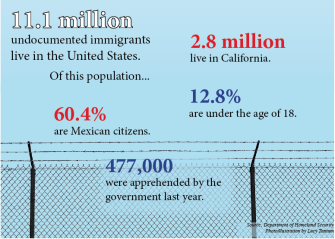When anonymous junior “Ellen” left South America at age 11, she thought it was only a vacation to see her younger cousins. She had no idea that she would stay for what has now been five years.
“I had no plans of living here,” Ellen said. “And then I kind of liked it here, and I told my dad I wanted to stay and finish school here, at least middle school. And then I just kind of stayed, till this day, and I don’t want to leave anymore. I love it here.”
Ellen is just one of the approximately 11 million undocumented immigrants currently in the U.S. She, like many other undocumented immigrants, left her home country for a chance at a better education and a better life.
However, the move to the U.S. was not without sacrifices. Ellen left her immediate family behind, and lived without them for four and a half years, until they recently joined her in the United States. Ellen says the years spent apart have had a lasting impact on her family.
“It still affects us today. I don’t have as much of a mom-to-daughter relationship with my mom anymore,” Ellen said. “It’s just different, you lose contact.”
However, both Ellen and her family realize that the change in their family dynamic was worth it, because of the better opportunities that Ellen now has access to.
“My mom always says that even though our family is sad about everything that happened, she says that I’m going to be someone in life, because of the education and people here,” Ellen said.

Not only did Ellen have to sacrifice an aspect of her family life, she also had to sacrifice many parts of life that most teenage American citizens may take for granted. Since she is undocumented, it is extremely difficult for Ellen to get a driver’s license or a job.
Accessing healthcare is another obstacle that proves challenging for undocumented immigrants. Since illegal immigrants can’t obtain health insurance, even the smallest injury or illness could cost thousands, because they have to pay out of pocket for the care they receive, rather than having insurance cover it.
California legislation has proposed a bill called the Health for All Act, which would allow illegal immigrants to receive Medicaid coverage, paid for by the state. However, the bill has not been passed, so many undocumented immigrants currently do not go to the doctor because of the cost.
Although doctors will see undocumented immigrants if they can pay, Ellen says the way doctors receive undocumented immigrants is very different from the way they receive citizens.
“When I go to the doctor with my aunt, she’s a citizen, and I see the difference in their attitude, the difference in what they prescribe to you, the ways they treat you,” Ellen said.
While there are programs and clinics that offer healthcare to undocumented immigrants, Ellen says the quality of the care given is undoubtedly different.
“I feel like it’s a different health care for citizens and for noncitizens, and I feel like that’s unequal, which is ironic because America is supposed to be equal rights for everyone, no matter who you are,” Ellen said.
The same is true for anonymous senior “Steven,” who moved from Brazil when he was seven.
For Steven, like Ellen, his move to the United States at age seven started out legally. He had a traveler’s visa, although after it expired in 2011 he decided to stay in the U.S. because of the better educational opportunities.
“It’s ten times better than Brazil about everything—education, safety. Just everything,” Steven said.
Although both Steven and Ellen believe that they have a better chance to be successful while living in the United States, their lives here are constantly plagued by the fear of deportation.
“I like not to think about it. I usually don’t think about it, but I worry. I definitely do. At least once a day, I think about it,” Steven said.
Tom Wilson, executive director of the Canal Alliance, a nonprofit organization that primarily works with low-income, Spanish-speaking immigrants, also attests to the overwhelming fear that consumes the lives of those living without papers.
“The main thing is fear,” Wilson said. “People are afraid that they’re somehow going to get in a situation that they’re going to be identified. Your life could change in a matter of moments. You went to the grocery store, and could find yourself on a bus headed towards the border.”
And that fear won’t go away until they have obtained citizenship, which is a lengthy, expensive process that often takes years.
“It’s pretty expensive, especially for a housecleaner who has to raise two kids. So, it took a few years, but we tried a couple times to get the papers, and this is the second time we’ve tried,” said Steven. “We’re putting everything into it.”

















